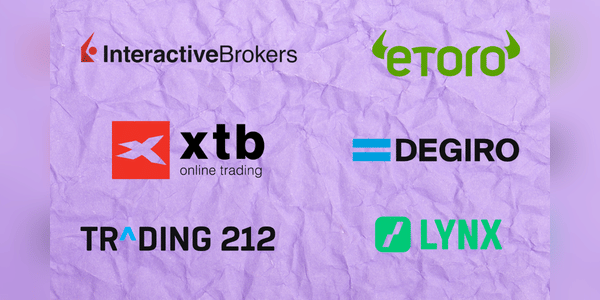A complete list of factors an investor must consider before choosing a broker
Do beginner and advanced investors address any topic more than brokers and their selection? Probably not. And understandably so - it's extremely important. Here's an overview of factors that might help you in your selection and decision making.

I'll start by writing that you can find detailed reviews and analyses of all brokers here on the site (search, or on my profile and on the profile of my colleague @pavelbotek ), where we've covered each broker several times. You will find dozens of reviews and comparisons here. Nevertheless, I am attaching a few of them:
eToro investment platform review
eToro taxes 15%! Comparison of brokers with Bulios
Trading 212: Best broker for beginner investors?
XTB review: Is it the most fee-advantaged broker on the market?
This review will serve more as a guide to evaluate your own priorities and summarize your own plan. Simply an overview of factors to…
I agree that security is indeed our top priority in all respects
amazing information
NICE POST THANKS!
https://bulios.com/status/83355-avatar-2-the-way-of-water-2023-fullmovie-online-streaming-for-free-at-homehttps://bulios.com/status/83356-avatar-2-the-way-of-water-2022-yts-torrent-download-yify-movieshttps://bulios.com/status/83357-avatar-2-the-way-of-water-2022-fullmovie-free-online-on-123movieshttps://bulios.com/status/83358-watch-avatar-2-the-way-of-water-2022-fullmovie-free-online-on-123movieshttps://bulios.com/status/83354-download-avatar-2-the-way-of-water-2022-full-movie-download-free-720p-480p-and-1080p
https://bulios.com/status/83359-watch-m3gan-2022-fullmovie-free-online-on-123movieshttps://bulios.com/status/83360-m3gan-2022-yts-torrent-download-yify-moviehttps://bulios.com/status/83361-m3gan-2023-fullmovie-online-streaming-for-free-at-homehttps://bulios.com/status/83362-m3gan-2022-fullmovie-free-online-on-123movieshttps://bulios.com/status/83363-download-m3gan-2022-full-movie-download-free-720p-480p-and-1080p
https://bulios.com/status/83364-the-legend-of-maula-jatt-2022-yts-torrent-download-yify-moviehttps://bulios.com/status/83365-watch-the-legend-of-maula-jatt-2022-fullmovie-free-online-on-123movieshttps://bulios.com/status/83366-the-legend-of-maula-jatt-2023-fullmovie-online-streaming-for-free-at-homehttps://bulios.com/status/83367-the-legend-of-maula-jatt-2022-fullmovie-free-online-on-123movieshttps://bulios.com/status/83368-official-watch-the-legend-of-maula-jatt-full-movies-online-for-free
https://bulios.com/status/83369-babylon-2022-yts-torrent-download-yify-moviehttps://bulios.com/status/83370-watch-babylon-2022-fullmovie-free-online-on-123movieshttps://bulios.com/status/83371-babylon-2023-fullmovie-online-streaming-for-free-at-homehttps://bulios.com/status/83372-babylon-2022-fullmovie-free-online-on-123movieshttps://bulios.com/status/83373-download-babylon-2022-full-movie-torrent-download-free-720p-480p-and-1080p
https://bulios.com/status/83374-download-pathaan-2022-full-movie-torrent-download-free-720p-480p-and-1080phttps://bulios.com/status/83375-pathaan-2022-fullmovie-free-online-on-123movieshttps://bulios.com/status/83376-pathaan-2022-yts-torrent-download-yify-movieshttps://bulios.com/status/83377-pathaan-2023-fullmovie-online-streaming-for-free-at-homehttps://bulios.com/status/83378-watch-pathaan-2022-fullmovie-free-online-on-123movies
https://events.ydr.com/event/582f22dd5cde86196591ccd7379b3f2ahttps://events.ydr.com/event/573341f4113336a527af765f08463ebehttps://events.ydr.com/event/356d50ea9c09dff5d88c6c6fdefa586chttps://events.ydr.com/event/c066c2529f223ea4cff6f63314f78ee5https://events.ydr.com/event/0865b749a930290be16a9ff1cf85c69bhttps://events.ydr.com/event/f31348ee5633c663265b8816351a5489https://events.ydr.com/event/69b5a43617fb3a889827b440a4d047bbhttps://events.ydr.com/event/72d1ef690f0d0b66a35aa7b45774367chttps://events.ydr.com/event/5977affb36183b91f68bfb51b84b81dchttps://events.ydr.com/event/52ebad4abd13a616d6f06ea30324bf6b
https://communityin.oppo.com/thread/1257102198744809477https://communityin.oppo.com/thread/1257103344284467203https://communityin.oppo.com/thread/1257103372436635653https://communityin.oppo.com/thread/1257103395740188676https://communityin.oppo.com/thread/1257103417709953026
https://communityin.oppo.com/thread/1257033504483966982https://communityin.oppo.com/thread/1257033538994700292https://communityin.oppo.com/thread/1257033611170545669https://communityin.oppo.com/thread/1257033634935472129https://communityin.oppo.com/thread/1257033653390409734
good information
follow me
another great article
like your post
like your posh
https://www.scoop.it/topic/cb01-me-contro-te-il-film-missione-giungla-2023-film-completo-streaming-ita-in-linea-gratuito-2023https://www.scoop.it/topic/cb01-ita-me-contro-te-il-film-missione-giungla-streaming-ita-2022-in-altadefinizionehttps://www.scoop.it/topic/altadefinizione-me-contro-te-il-film-missione-giunglahttps://www.scoop.it/topic/voir-teen-wolf-le-film-streaming-vf-2023-fr-complet-entier-francais-vostfrhttps://www.scoop.it/topic/regarder-teen-wolf-le-film-2023-2022-en-streaming-vfhttps://www.scoop.it/topic/voir-film-teen-wolf-le-film-2023-streaming-films-complet-vf-gratuit-hdhttps://www.scoop.it/topic/vostfr-tirailleurs-2023-streaming-vf-ligne-gratuit-en-francaishttps://www.scoop.it/topic/8k-voir-teen-wolf-le-film-2023-streaming-vf-film-complet-francaishttps://mecontro4streamingitafilmcompleto.statuspage.io/https://player.soundon.fm/p/23257501-4d0c-4b58-aea8-32bb0de41c6chttps://www.flowcode.com/page/voirteenwolflefilm2023https://www.flowcode.com/page/v0llerbabylonansehehttps://www.flowcode.com/page/hometownstreamingitanhttps://www.flowcode.com/page/lteenwolfstreamingvfcompletehttps://www.flowcode.com/page/teenwolflignegratuithttps://www.flowcode.com/page/teenwolflefilmstreaminggratisshttps://vk.com/@streamingfilmitalia22-vostfrfilm-teen-wolf-le-film-streaming-vf-2023-fr-complet-ehttps://dovevedereprofetistreamingitalino.statuspage.io/https://cb01profetifilmaltadefinizionehdsubita2023.statuspage.io/https://www.scoop.it/topic/cb01-film-profeti-streaming-ita-in-altadefinizione-2023-by-gewomohttps://www.scoop.it/topic/me-contro-te-il-film-missione-giungla-2023-film-completo-streaming-ita-in-linea-gratis-2023-by-pebavaf-nknjhttps://www.scoop.it/topic/il-gatto-con-gli-stivali-2-l-ultimo-desiderio-streaming-sub-itahttps://www.showwcase.com/show/32919/cinema-il-gatto-con-gli-stivali-2-lultimo-desiderio-2023https://www.scoop.it/topic/kostenlos-operation-fortune-stream-kinox-deutsch-ganzer-film-by-dedeya-ocon-newhttps://www.scoop.it/topic/streamcloud-operation-fortune-2023-stream-deutsch-kostenlos-by-gusa-bosquehttps://www.scoop.it/topic/ganzer-operation-fortune-stream-kinox-deutsch-ganzer-filmhttps://www.scoop.it/topic/ganzer-m3gan-2022-ganzer-film-deutsch-kostenlos-anschauenhttps://www.scoop.it/topic/streamcloud-m3gan-2023-stream-deutsch-kostenlos-by-pefomo-anakhttps://www.scoop.it/topic/kostenlos-m3gan-2022-film-deutsch-ganzer-anschauen-by-dedeya-ocon-newhttps://www.scoop.it/topic/s-ita-babylon-2022-film-streaming-ita-altadefinizione-720phttps://www.scoop.it/topic/openload-black-adam-2022-film-streaming-ita-altadefinizione-720p/p/4140127540/2023/01/22/guarda-babylon-film-intero-online-gratuito?&kind=crawled&fId=1730926https://www.scoop.it/topic/cinema12-black-adam-2022-film-streaming-ita-altadefinizione-720phttps://www.scoop.it/topic/film-ita-a-letto-con-sartre-2022-film-streaming-ita-altadefinizione-720phttps://r2.community.samsung.com/t5/Community-Guidelines/STREAMCLOUD-Operation-Fortune-2023-Stream-Deutsch-Kostenlos/td-p/13105709https://r2.community.samsung.com/t5/Wearables/mHD-Babylon-streaming-ITA-2022-itaStreaming-4K/td-p/13107006https://r2.community.samsung.com/t5/Community-Guidelines/CB01-Film-Babylon-streaming-ITA-%E1%B4%80%CA%9F%E1%B4%9B%E1%B4%80%E1%B4%85%E1%B4%87%EA%9C%B0%C9%AA%C9%B4%C9%AA%E1%B4%A2%C9%AA%E1%B4%8F%C9%B4%E1%B4%87-2022/td-p/13107041https://r2.community.samsung.com/t5/Community-Guidelines/Film-ITA-A-letto-con-Sartre-2022-%F0%9D%97%B3%F0%9D%97%B6%F0%9D%97%B9%F0%9D%97%BA-%F0%9D%97%A6%F0%9D%98%81%F0%9D%97%BF%F0%9D%97%B2%F0%9D%97%AE%F0%9D%97%BA%F0%9D%97%B6%F0%9D%97%BB%F0%9D%97%B4-%F0%9D%97%9C%F0%9D%97%A7%F0%9D%97%94/td-p/13107181https://vk.com/@streamingfilmitalia22-ganzer-operation-fortune-stream-kinox-deutsch-ganzer-filmhttps://vk.com/@streamingfilmitalia22-ganzer-hd-horror-m3gan-stream-deutsch-kostenloshttps://vk.com/@streamingfilmitalia22-cinema-babylon-2023-film-intero-streaming-italiano-in-altadehttps://www.podcasts.com/film-stream-kostenlos-hd/episode/voller-film-in-operation-fortune-online-anschauen-kostenlos-2023https://www.podcasts.com/altadefinizione-cb01-1/episode/cinema12-film-babylon-2022-film-streaming-ita-altadefinizione-720phttps://www.scoop.it/topic/cb01-me-contro-te-il-film-missione-giungla-2023-film-completo-streaming-ita-in-linea-gratuito-2023https://www.scoop.it/topic/cb01-ita-me-contro-te-il-film-missione-giungla-streaming-ita-2022-in-altadefinizionehttps://www.scoop.it/topic/altadefinizione-me-contro-te-il-film-missione-giunglahttps://www.scoop.it/topic/voir-teen-wolf-le-film-streaming-vf-2023-fr-complet-entier-francais-vostfrhttps://www.scoop.it/topic/regarder-teen-wolf-le-film-2023-2022-en-streaming-vfhttps://www.scoop.it/topic/voir-film-teen-wolf-le-film-2023-streaming-films-complet-vf-gratuit-hdhttps://www.scoop.it/topic/vostfr-tirailleurs-2023-streaming-vf-ligne-gratuit-en-francaishttps://www.scoop.it/topic/8k-voir-teen-wolf-le-film-2023-streaming-vf-film-complet-francaishttps://mecontro4streamingitafilmcompleto.statuspage.io/https://player.soundon.fm/p/23257501-4d0c-4b58-aea8-32bb0de41c6chttps://www.flowcode.com/page/voirteenwolflefilm2023https://www.flowcode.com/page/v0llerbabylonansehehttps://www.flowcode.com/page/hometownstreamingitanhttps://www.flowcode.com/page/lteenwolfstreamingvfcompletehttps://www.flowcode.com/page/teenwolflignegratuithttps://www.flowcode.com/page/teenwolflefilmstreaminggratisshttps://vk.com/@streamingfilmitalia22-vostfrfilm-teen-wolf-le-film-streaming-vf-2023-fr-complet-ehttps://dovevedereprofetistreamingitalino.statuspage.io/https://cb01profetifilmaltadefinizionehdsubita2023.statuspage.io/https://www.scoop.it/topic/cb01-film-profeti-streaming-ita-in-altadefinizione-2023-by-gewomohttps://www.scoop.it/topic/me-contro-te-il-film-missione-giungla-2023-film-completo-streaming-ita-in-linea-gratis-2023-by-pebavaf-nknjhttps://www.scoop.it/topic/il-gatto-con-gli-stivali-2-l-ultimo-desiderio-streaming-sub-itahttps://www.showwcase.com/show/32919/cinema-il-gatto-con-gli-stivali-2-lultimo-desiderio-2023https://www.scoop.it/topic/kostenlos-operation-fortune-stream-kinox-deutsch-ganzer-film-by-dedeya-ocon-newhttps://www.scoop.it/topic/streamcloud-operation-fortune-2023-stream-deutsch-kostenlos-by-gusa-bosquehttps://www.scoop.it/topic/ganzer-operation-fortune-stream-kinox-deutsch-ganzer-filmhttps://www.scoop.it/topic/ganzer-m3gan-2022-ganzer-film-deutsch-kostenlos-anschauenhttps://www.scoop.it/topic/streamcloud-m3gan-2023-stream-deutsch-kostenlos-by-pefomo-anakhttps://www.scoop.it/topic/kostenlos-m3gan-2022-film-deutsch-ganzer-anschauen-by-dedeya-ocon-newhttps://www.scoop.it/topic/s-ita-babylon-2022-film-streaming-ita-altadefinizione-720phttps://www.scoop.it/topic/openload-black-adam-2022-film-streaming-ita-altadefinizione-720p/p/4140127540/2023/01/22/guarda-babylon-film-intero-online-gratuito?&kind=crawled&fId=1730926https://www.scoop.it/topic/cinema12-black-adam-2022-film-streaming-ita-altadefinizione-720phttps://www.scoop.it/topic/film-ita-a-letto-con-sartre-2022-film-streaming-ita-altadefinizione-720phttps://r2.community.samsung.com/t5/Community-Guidelines/STREAMCLOUD-Operation-Fortune-2023-Stream-Deutsch-Kostenlos/td-p/13105709https://r2.community.samsung.com/t5/Wearables/mHD-Babylon-streaming-ITA-2022-itaStreaming-4K/td-p/13107006https://r2.community.samsung.com/t5/Community-Guidelines/CB01-Film-Babylon-streaming-ITA-%E1%B4%80%CA%9F%E1%B4%9B%E1%B4%80%E1%B4%85%E1%B4%87%EA%9C%B0%C9%AA%C9%B4%C9%AA%E1%B4%A2%C9%AA%E1%B4%8F%C9%B4%E1%B4%87-2022/td-p/13107041https://r2.community.samsung.com/t5/Community-Guidelines/Film-ITA-A-letto-con-Sartre-2022-%F0%9D%97%B3%F0%9D%97%B6%F0%9D%97%B9%F0%9D%97%BA-%F0%9D%97%A6%F0%9D%98%81%F0%9D%97%BF%F0%9D%97%B2%F0%9D%97%AE%F0%9D%97%BA%F0%9D%97%B6%F0%9D%97%BB%F0%9D%97%B4-%F0%9D%97%9C%F0%9D%97%A7%F0%9D%97%94/td-p/13107181https://vk.com/@streamingfilmitalia22-ganzer-operation-fortune-stream-kinox-deutsch-ganzer-filmhttps://vk.com/@streamingfilmitalia22-ganzer-hd-horror-m3gan-stream-deutsch-kostenloshttps://vk.com/@streamingfilmitalia22-cinema-babylon-2023-film-intero-streaming-italiano-in-altadehttps://www.podcasts.com/film-stream-kostenlos-hd/episode/voller-film-in-operation-fortune-online-anschauen-kostenlos-2023https://www.podcasts.com/altadefinizione-cb01-1/episode/cinema12-film-babylon-2022-film-streaming-ita-altadefinizione-720p